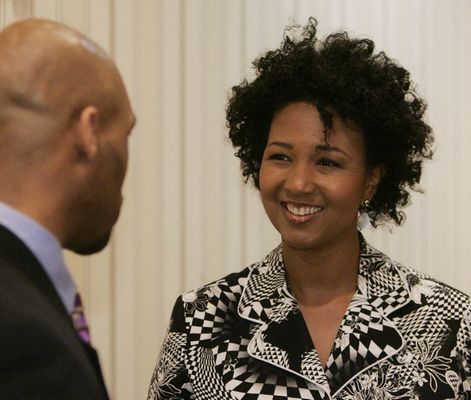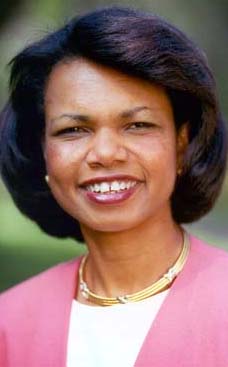2006.02.02: February 2, 2006: Headlines: Figures: COS - Sierra Leone: Staff: Science: Space: Genetics: Seattle Times: Mae Jemison takes part in Genetic Research Project
Peace Corps Online:
Directory:
Sierra Leone:
Special Report: Sierra Leone Peace Corps Medical Officer and NASA Mission Specialist Dr. Mae Jemison:
February 9, 2005: Index: PCOL Exclusive: Staffer Mae Jemison :
2006.02.02: February 2, 2006: Headlines: Figures: COS - Sierra Leone: Staff: Science: Space: Genetics: Seattle Times: Mae Jemison takes part in Genetic Research Project
Mae Jemison takes part in Genetic Research Project

Did you happen to catch the PBS program "African American Lives?" It's another project from Harvard professor Henry Louis Gates Jr. It traces the family history of eight famous African Americans and of Gates himself using historical research and the latest genetic techniques. Some of the findings surprised his guests. Mae Jemison, the first black woman to travel in space, is about 13 percent Asian. Historians say some plantation owners imported Asian workers to replace slaves after emancipation. The experiments didn't work well, but did introduce some new genetic material. Astronaut Mae Jemison, the first Afro-American woman in space, served as a Peace Corps Medical Officer in Sierra Leone.
Mae Jemison takes part in Genetic Research Project
Setting notions of race on their ear
By Jerry Large
Seattle Times staff columnist
Photo: Rob Goebel / The Star
Are people with wet earwax better athletes than people with dry earwax? You have to wonder, since almost all of the players in Sunday's Super Bowl have wet earwax.
The run-up to the big game is being covered from a zillion angles, but no one has touched the players' earwax. Whatever happened to journalism that probes deeply?
OK, I'm not being serious. No one would think earwax could affect athletic ability, or intelligence, or anything significant about a person. We assign that kind of importance to traits less consequential than earwax, such as skin color. But that's because we place a lot of weight on differences we can see.
People have long known about the differences in earwax that correspond with race, or more accurately, with ancestral population groups, but genetic research has shed more light on the topic.
Genetics is doing that with lots of aspects of human makeup.
Did you happen to catch the PBS program "African American Lives?" It's another project from Harvard professor Henry Louis Gates Jr. It traces the family history of eight famous African Americans and of Gates himself using historical research and the latest genetic techniques.
The first two parts aired Wednesday. Genetics plays its biggest role in the final two parts, which air Feb. 8 and make the link to Africa.
Some of the findings surprised his guests. Mae Jemison, the first black woman to travel in space, is about 13 percent Asian. Historians say some plantation owners imported Asian workers to replace slaves after emancipation. The experiments didn't work well, but did introduce some new genetic material.
Jemison thought she had Native American roots somewhere in her family tree.
Most of Gates' guests thought they had Native American blood. Many black folks a generation ago were eager to be something other than plain Negroes, to be just a notch higher in the hierarchy.
advertising
Oprah, another of the guests, did have Indian ancestors, according to the tests. She had no white ancestors, which is surprising.
Quincy Jones was around 40 percent white and Gates was 50 percent white with other markers matching people in North Africa. Indeed, researchers had to do extra tests to find any sub-Saharan African link in his genes.
So now they know, and knowing has cultural and emotional meaning for them, but it doesn't change who they are.
Gates joked that he should step down from his job as head of the African-American studies department. It's OK, bro, you still have wet earwax.
Japanese researchers this week reported their discovery of the small DNA change that turns off the gene for wet earwax, which every person had originally.
Africans and Europeans mostly (97 percent) have wet wax and Asians mostly have the dry kind, as do many Native Americans. Functionally one kind is as good as the other, and though you and I may have an aesthetic preference, neither of us is likely to judge another by his earwax.
Last month some other scientists discovered the way another difference works, but they were concerned about reaction to their announcement because it had to do with skin color.
What they found is that Africans have the original gene, which made all people brown until relatively recently when humans began to migrate out of Africa. At some point, a single individual was born with a mutation in the gene, which caused his or her skin to be much lighter.
The mutation disrupts the process by which melanin is deposited in skin cells. Europeans have this mutation. A second change happened in Asia, where a different process reduced melanin in the skin.
Researchers were careful to downplay the racial aspects of the finding. The European mutation, they said, changes one letter of DNA code out of 3.1 billion. But they admitted nothing they could say would stop people from clinging to various racial theories.
Keith Cheng, the study leader, was quoted in the Washington Post saying, "I think human beings are extremely insecure and look to visual cues of sameness to feel better, and people will do bad things to people who look different."
Being black, white, Indian, Asian are matters of very little genetic material. They matter because of the judgments we make about each other, judgments that are only skin deep.
Why, even wet earwax does not guarantee a superior character.
Jerry Large: 206-464-3346 or jlarge@seattletimes.com.
When this story was posted in March 2006, this was on the front page of PCOL:





Peace Corps Online The Independent News Forum serving Returned Peace Corps Volunteers
 | Peace Corps suspends program in Bangladesh
Peace Corps Director Gaddi H. Vasquez announced the suspension of the Peace Corps program in Bangladesh on March 15. The safety and security of volunteers is the number one priority of the Peace Corps. Therefore, all Peace Corps volunteers serving in Bangladesh have safely left the country. More than 280 Peace Corps volunteers have served in Bangladesh since the program opened in November 1998. Latest: What other newspapers say. |
 | The Peace Corps Library
The Peace Corps Library is now available online with over 40,000 index entries in 500 categories. Looking for a Returned Volunteer? Check our RPCV Directory. New: Sign up to receive PCOL Magazine, our free Monthly Magazine by email. Like to keep up with Peace Corps news as it happens? Sign up to recieve a daily summary of Peace Corps stories from around the world. |
 | Invitee re-assigned after inflammatory remarks
The Peace Corps has pulled the invitation to Derek Volkart to join the Morocco Training Program and offered him a position in the Pacific instead after officials read an article in which he stated that his decision to join the Peace Corps was in "response to our current fascist government." RPCV Lew Nash says that "If Derek Volkart spoke his mind as freely in Morocco about the Moroccan monarchy it could cause major problems for himself and other Peace Corps volunteers." Latest: The Ashland Daily Tidings has issued a request for all Peace Corps communications on the case. |
 | Re-envision Peace Corps
Nicholas J. Slabbert says in his article in the Harvard International Review that an imaginatively reinvented Peace Corps could powerfully promote US interests in a period when perceptions of American motives are increasingly relevant to global realignment. His study envisions a new role for the Peace Corps in five linked areas: (1) reinventing America's international profile via a new use of soft power; (2) moving from a war-defined, non-technological, reactive theory of peace to a theory of peace as a normal, proactive component of technologically advanced democracy; (3) reappraising Peace Corps as a national strategic asset whose value remains largely untapped; (4) Peace Corps as a model for the technological reinvention of government agencies for the 21st century; (5) redefining civil society as information technology society. Read the article and leave your comments. |
 | March 1, 1961: Keeping Kennedy's Promise
On March 1, 1961, President John F. Kennedy issues Executive Order #10924, establishing the Peace Corps as a new agency: "Life in the Peace Corps will not be easy. There will be no salary and allowances will be at a level sufficient only to maintain health and meet basic needs. Men and women will be expected to work and live alongside the nationals of the country in which they are stationed--doing the same work, eating the same food, talking the same language. But if the life will not be easy, it will be rich and satisfying. For every young American who participates in the Peace Corps--who works in a foreign land--will know that he or she is sharing in the great common task of bringing to man that decent way of life which is the foundation of freedom and a condition of peace. " |
 | Paid Vacations in the Third World?
Retired diplomat Peter Rice has written a letter to the Wall Street Journal stating that Peace Corps "is really just a U.S. government program for paid vacations in the Third World." Director Vasquez has responded that "the small stipend volunteers receive during their two years of service is more than returned in the understanding fostered in communities throughout the world and here at home." What do RPCVs think? |
 | RPCV admits to abuse while in Peace Corps
Timothy Ronald Obert has pleaded guilty to sexually abusing a minor in Costa Rica while serving there as a Peace Corps volunteer. "The Peace Corps has a zero tolerance policy for misconduct that violates the law or standards of conduct established by the Peace Corps," said Peace Corps Director Gaddi H. Vasquez. Could inadequate screening have been partly to blame? Mr. Obert's resume, which he had submitted to the Peace Corps in support of his application to become a Peace Corps Volunteer, showed that he had repeatedly sought and obtained positions working with underprivileged children. Read what RPCVs have to say about this case. |
 | Why blurring the lines puts PCVs in danger
When the National Call to Service legislation was amended to include Peace Corps in December of 2002, this country had not yet invaded Iraq and was not in prolonged military engagement in the Middle East, as it is now. Read the story of how one volunteer spent three years in captivity from 1976 to 1980 as the hostage of a insurrection group in Colombia in Joanne Marie Roll's op-ed on why this legislation may put soldier/PCVs in the same kind of danger. Latest: Read the ongoing dialog on the subject. |
 | Friends of the Peace Corps 170,000 strong
170,000 is a very special number for the RPCV community - it's the number of Volunteers who have served in the Peace Corps since 1961. It's also a number that is very special to us because March is the first month since our founding in January, 2001 that our readership has exceeded 170,000. And while we know that not everyone who comes to this site is an RPCV, they are all "Friends of the Peace Corps." Thanks everybody for making PCOL your source of news for the Returned Volunteer community. |
Read the stories and leave your comments.

Some postings on Peace Corps Online are provided to the individual members of this group without permission of the copyright owner for the non-profit purposes of criticism, comment, education, scholarship, and research under the "Fair Use" provisions of U.S. Government copyright laws and they may not be distributed further without permission of the copyright owner. Peace Corps Online does not vouch for the accuracy of the content of the postings, which is the sole responsibility of the copyright holder.
Story Source: Seattle Times
This story has been posted in the following forums: : Headlines; Figures; COS - Sierra Leone; Staff; Science; Space; Genetics
PCOL32189
64

















